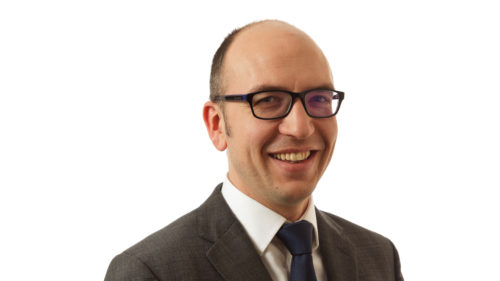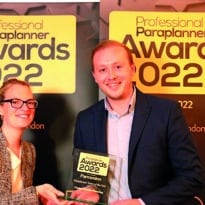Benjamin Fabi, paraplanner with Jones-Sheridan, has had something of a chequered job history, he admits
Talk to Benjamin Fabi, about a particular paraplanning role and he can probably say ‘been there, done that’.
The paraplanner with Cheshire based financial planning firm Jones-Sheridan jokes that at one time his friends used to say to him that every time he woke up he had a new job.
While that is stretching things, he admits his career within financial services and as a paraplanner has been “chequered”.
To list his career to date: He has worked as a bank cashier, financial adviser, complaints handler at the financial Ombudsman, for software company O&M Systems, as an outsourced paraplanner both for others and running his own business, and as in-house paraplanner. He says in the role he has now, he feels settled and is in a good place when it comes to his working life and his home life.
That chequered career needs explaining.
His first job in financial services in a branch of NatWest, working as a cashier before he trained as a financial planning manager. He worked as an adviser for 15 months. However, he says he felt “morally conflicted” by having to give tied advice and having to meet high-pressure sales targets. “It was getting me down. I felt I was just flogging product to meet sales targets.” So he quit the job.
Working for FOS
Around that time the Financial Services Ombudsman (FOS) was inundated with complaints about mortgage endowments and personal pension switching and he secured a job on the pensions complaints team. “It was a great place to work. We had a great team with a great manager. There was a real collegiate attitude about getting the right outcome for every case,” he says.
While FOS takes a lot of stick, it finds itself in a difficult place, he adds. “It’s not a judicial system but it has been given arbitration powers that are binding. FOS is seen as a consumer champion but that’s not its role, it has to be impartial. It’s a tricky position to be in.”
While working for the Ombudsman Benjamin dealt mostly with complaints about providers in connection with legacy pension contracts and Section 32s that had been revised under the Pension Review. “I learned a lot about the pension review process and about pensions transfers, which has stood me in good stead in my career to date.
“I also dealt with complaints from IFAs, which needed a very different approach. A complaint about a provider will most likely be dealt with by a department head but an adviser will often be the business owner and the complaint is from a client, which makes it a much more personal and emotive experience with which to deal.”
Asked whether he feels a disconnect exists between the FCA rules and the FOS rulings, Benjamin believes that to some extent there can be, from a practical perspective. “Fundamentally, while the FCA and the FOS were both set up under the same act of Parliament they are separate organisations with separate remits. The FCA sets out the rules and the Ombudsman has to have regard as to what is fair and reasonable in the individual circumstances. Often the Ombudsman is looking for best practice. When I was at the Ombudsman we were looking to do a good job that was fair to both parties.”
What adviser firms can’t do, he adds, is think that if a report is compliant then the advice must be suitable. “You can’t follow a tick box process and believe it will hold up if the advice wasn’t the best advice for the client.”
While at the Ombudsman Benjamin became diploma qualified but at the end of 2007 as the volume of pensions complaints began to tail off, the Ombudsman went though a structural change and started laying people off. Benjamin decided to resign. “I could see with the proposed changes that it simply wouldn’t be the same place to work in,” he says.
After FOS
Having taken time out to go on honeymoon, Benjamin then took his first job as paraplanner working for an IFA in the City of London. Asked what made him go for a paraplanner role after working at FOS, rather than an adviser role for which he was qualified, he says: “The paraplanner role looked like a natural fit for me. It allowed me to take the experience of analysing circumstances, taking into account what is going on, coming to a solution or outcome, and then crafting documents around it. My job at the Ombudsman and the paraplanner role were mapable in that respect.”
Nevertheless, it was totally new role to him. “I was thrown in at the deep end and found I loved it. There was an adviser, two paraplanners and an administrator. It was a good job in which to cut my teeth as a paraplanner.”
In 2009 with an addition to the family on the way, he decided to find a job closer to home in Colchester. By then he was AF3 qualified and he landed a job with O&M Systems in an advisory role as a pension transfer specialist.
After a year he moved to a firm of 10 advisers, setting up and running the pension transfer department for the firm, as well as paraplanning.
Outsourced paraplanning
Having met Richard Allum of The Paraplanners at the IFP paraplanner conference, and seeing the potential for outsourced paraplanning, he left the local adviser to set up his own company, and was lucky enough to start working almost immediately with a couple of “good advisers who had moved on from the firm”.
The problem he says, in hindsight, was that he kept the business working for a those advisers and did not market or promote it, so with another child on the way he decided he needed to go back to employed work and took on a full time paraplanning role with Damian Davies’s The Timebank.
“That was when my career as a paraplanner started to get on track. I had the best part of three good years there and it was good fun.”
Moreover, he says, the experience really expanded his paraplanning skills. “When you are working as an outsourced paraplanner you learn a lot about paraplanning and how to be a paraplanner because you are dealing with a range of different firms that all do things differently. You get to see a lot of different ways of doing pretty much everything – from product research to compliance to investment philosophy through to writing style. It takes some time to get into the flow of that, it’s almost like you have to be 5-6 different paraplanners depending on which firm you are working for. But you get a broad experience of working styles as well as working with different software and technologies, which is invaluable.”
Change of lifestyle
During his time with The Timebank Benjamin and his wife made a way-of-life decision to move from Colchester in Essex, to a slower paced, more community-based life in Staffordshire.
This also made him review his career and where, as a father of two, he wanted to be. He explains: “I had a great time at The Timebank but effectively I had to make a decision whether to stay there or move on. With the advantages of working from home, with all the benefits and flexibility that brings, especially with a young family, it was a big decision to become an In-house paraplanner again. But it was the right decision.”
He applied for and won the role of paraplanner with Jones Sheridan, based in Crewe, Cheshire.
“It’s a great firm. It’s forward thinking. The directors know what they don’t know and they look for people to fill the gaps in the firm’s knowledge and skills base. It’s refreshing and nice to work in an environment where you sit round the table discussing cases as a peer group, knowing the strengths and weaknesses each other has and using that to the best advantage of the client. It’s a great approach.”
Benjamin joined a team of two paraplanners and a dedicated administrator. “Now I’m technically the client research manager and I head the team, which is a great team. We all get on well, we look to do a great job and do the right thing for clients.
“We try to keep suitability reports short and adopt Rory Percival’s idea that less is more. Our target report length is eight to 12 pages, plus appendix and it concentrates on what the client wants.”
It’s an approach, he says “that I’ve always wanting to bring to paraplanning. I read a lot of suitability reports when I was at the Ombudsman. A lot of them were fluff. So part of my job as a paraplanner is to really deconstruct suitability reports and make them objectives driven.”
Asked if there is any part of his job history that he regrets, he says: “I don’t regret any of it. It’s been a good journey and the experience it has given me has led me to where I am now, and that’s a good place for me and my family.”
What might a typical day look like?
On a typical Monday morning, the kids always get me up early so I use that to my advantage and get in to the office around 7.15am. My first job is to check emails, to see if there were any jobs that didn’t get cleared in the week before and try to clear my inbox.
We have a workflow system that we run through IntelliFlo’s Intelligent Office, so I will check what is in the workflow to be dealt with in the week. Then we will have a quick team meeting early morning, with input from compliance on best practice from the previous week, and the head of advice gets involved too. Then we share out the work and go back to our desks and crack on.
I will deal with any departmental issues like admin processes or non-client work and then it’s into report writing.
We debrief client meetings throughout the day, as advisers come and go between meetings. We’ll have case discussions and look at any cases that might prove complex or difficult. When there are two or three different ways of dealing with a case we might get the adviser in to talk through what might be the best solution. They know the client. We don’t tend to sit in on client meetings.
We do a lot of at retirement advice. Which for me has been brilliant because if there is one area I know really well it is pensions.
We finish at 4.30pm unless we need to stay late. We finish at 3.30pm on a Friday, which is great. I had to double take that piece of information at interview.
Mountain biking
Outside of work Benjamin is a keen cyclist, primarily mountain biking. Last summer he took part in a charity road ride. He and five friends raised over £12,000 for Colchester hospital’s cancer ward by riding from Colchester to Brighton and along the coast to Land End in 5 days. “It was easily the hardest thing I’ve ever done,” he says. “The weather was atrocious, except for the last day, which was sunny when we got to lands end.
He took up mountain biking when he was working from home and has taken part in racing seasons. “It’s good fun, it’s fast, it’s technical and it’s demanding – it’s a good release of energy after a hard week of paraplanning.”
Paraplanner community
Benjamin says he finds the paraplanning community is superb at helping each other out and he finds the forums extremely useful. “I used to contribute quite a bit to the old Paraplanner Forum. Now I’m a contributor to the Powwwow Big Tent. I’ll ask questions as well as answer them. I think it’s a great resource.
“One of the most important things about being a paraplanner is knowing what you don’t know and knowing where to find the information to fill that gap. That’s our job. One of the places you can do that is the forum. Chances are that you will post up a question and someone will have had that experience or problem before and can help you out.”





























